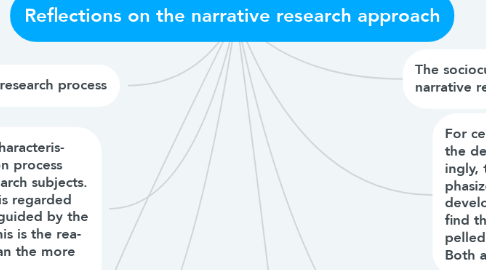Reflections on the narrative research approach
by Luis Valdes

1. We have seen that Vygotsky (1978) and Bakhtin (1986) argued for the need to go beyond the isolated in- dividual when trying to understand human develop- ment and functioning. When using their ideas as a theoretical framework, the challenge is to examine and understand how human actions are related to the social context in which they occur and to consider how and where they occur through growth. The task for the analysis is therefore to find a way to avoid the pitfalls of individualistic and societal reductionism. The narra- tive as a unit of analysis provides the means for doing this (Wertsch, 1998). Before exploring this issue, let us take a moment to examine Vygotsky’s ideas on the unit of analysi
2. Although other qualitative research approaches, such as case studies, biographies, phenomenological studies, grounded the- ory studies, and ethnographic studies, are described in detail, the literature on narrative research appears to be rather vague about concrete inquiry procedures. In this section I will focus on three recurrent issues in discus- sions on the narrative research approach. First is the re- lationship between the researcher and her or his research subjects. The second is how a narrative is de- veloped from an experienced and orally told story into a written text, and the third is the hermeneutic or inter- pretive nature of narrative research.
3. As will be shown below, one of the main characteris- tics of narrative research is the collaboration process between the researcher and her or his research subjects. Within this approach, the research subject is regarded as a collaborator rather than an informant guided by the agenda of the researcher (Altork, 1998). This is the rea- son why I prefer research subject rather than the more traditional term informant
4. The narrative research process
5. Narratives as a unit of analysis
6. contexts individuals encounter are based on where they are at any particular point in time. As historical condi- tions are constantly changing, this also results in changed contexts and opportunities for learning and development. Thus, consciousness, or the human mind, cannot be considered as a fixed category, in the sense that it can be described once and for all (Schribner, 1985). Quite to the contrary, it is a category undergoing continual change and development, a change and development that occur in step with histori- cal development and activities on the social plane.
7. For centuries, scholars have studied and puzzled over the development of human beings, leading, not surpris- ingly, to a number of theories. We find models that em- phasize the importance of the environment for the development of individuals, and, on the other hand, we find theories that focus on how development is pro- pelled by an inner biological maturing of individuals. Both approaches represent traditional epistemologies.
8. The sociocultural foundation of narrative research


